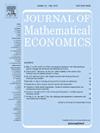Impossibility results in the probabilistic assignment problem with stochastic same-sidedness and minimal invariance
IF 0.7
4区 经济学
Q3 ECONOMICS
引用次数: 0
Abstract
Bogomolnaia and Moulin (2001) demonstrate the impossibility of designing a rule that simultaneously satisfies stochastic dominance efficiency, equal treatment of equals, and stochastic dominance strategy-proofness in the context of the probabilistic assignment problem with indivisible objects. Despite attempts to relax these conditions by introducing concepts like upper contour strategy-proofness or robust ex-post efficiency, the impossibility results remain. Recently, Bandhu et al. (2024) introduced the concept of stochastic same-sidedness in the random voting model. This condition stipulates that if an agent modifies their preference by swapping two consecutively ranked objects, then (1) the sum of probabilities assigned to objects strictly higher than the swapped pair should remain unchanged, and (2) the sum of probabilities assigned to the swapped pair should also remain constant. We first show that the impossibility persists even when stochastic dominance strategy-proofness is weakened to stochastic same-sidedness. We then decompose stochastic same-sidedness into three minimal invariance axioms and use these to establish further impossibility results.
具有随机同侧最小不变性的概率分配问题的不可能性结果
Bogomolnaia和Moulin(2001)证明,在具有不可分割目标的概率分配问题中,不可能设计出同时满足随机优势效率、平等对待平等和随机优势策略抗性的规则。尽管试图通过引入诸如上轮廓策略抗扰性或稳健事后效率等概念来放宽这些条件,但不可能的结果仍然存在。最近,Bandhu等人(2024)在随机投票模型中引入了随机同侧性的概念。该条件规定,如果一个代理通过交换两个连续排序的对象来修改其偏好,那么(1)分配给严格高于交换对的对象的概率之和应保持不变,(2)分配给交换对的概率之和也应保持不变。我们首先证明,即使随机优势策略证明性被削弱为随机同侧性,不可能性仍然存在。然后,我们将随机同侧性分解为三个最小不变性公理,并利用这些公理建立进一步的不可能性结果。
本文章由计算机程序翻译,如有差异,请以英文原文为准。
求助全文
约1分钟内获得全文
求助全文
来源期刊

Journal of Mathematical Economics
管理科学-数学跨学科应用
CiteScore
1.70
自引率
7.70%
发文量
73
审稿时长
12.5 weeks
期刊介绍:
The primary objective of the Journal is to provide a forum for work in economic theory which expresses economic ideas using formal mathematical reasoning. For work to add to this primary objective, it is not sufficient that the mathematical reasoning be new and correct. The work must have real economic content. The economic ideas must be interesting and important. These ideas may pertain to any field of economics or any school of economic thought.
 求助内容:
求助内容: 应助结果提醒方式:
应助结果提醒方式:


